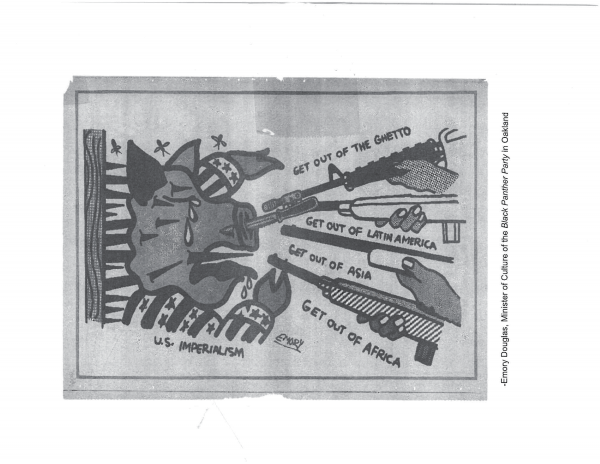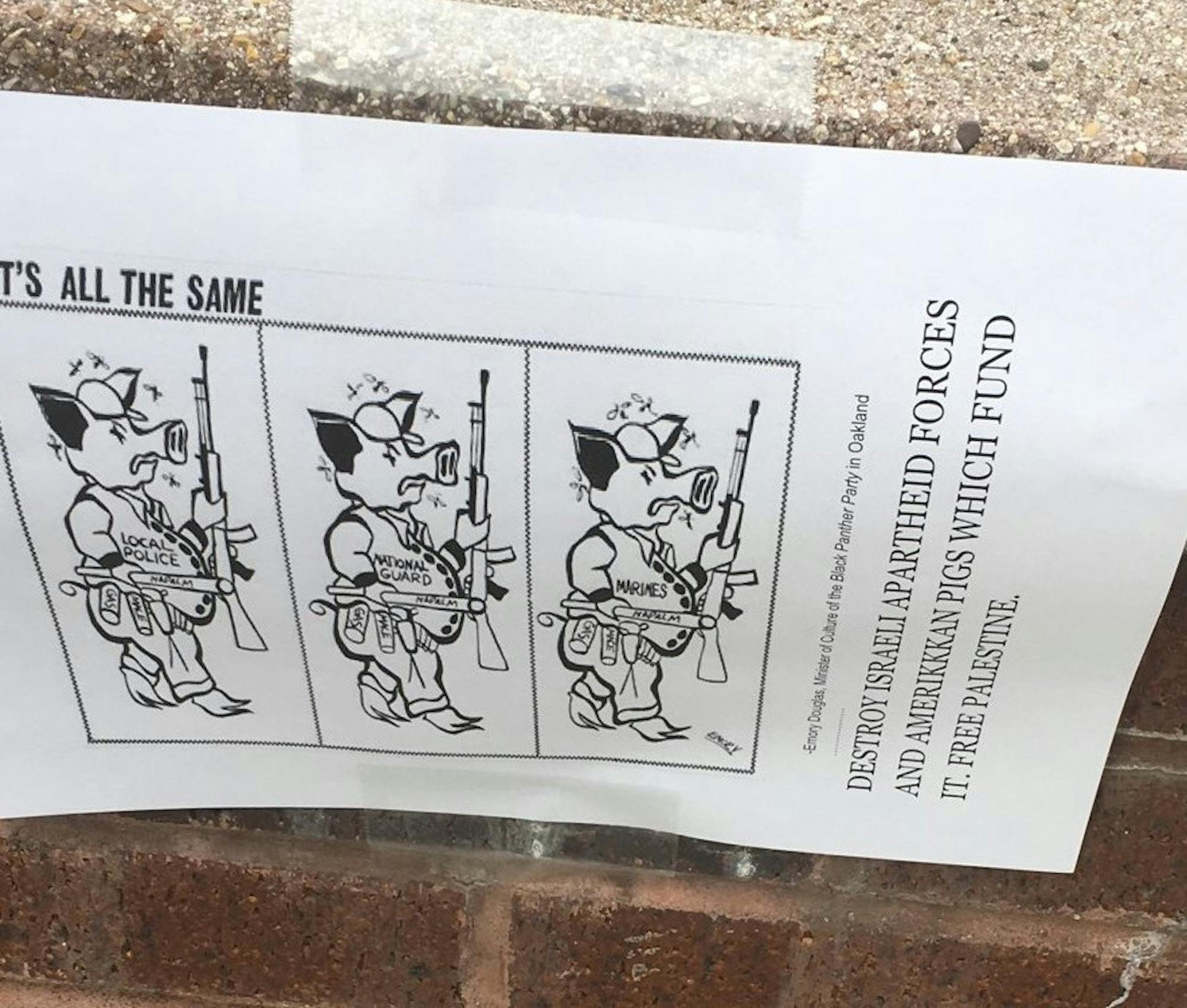Flyers depicting militarized pigs, including at least one with a caption calling for the destruction of “ISRAELI APARTHEID FORCES AND AMERIKKKAN [sic] PIGS WHICH FUND IT,” were discovered yesterday morning on the exterior of Granoff Family Hillel Center.
Over two dozen posters were found, according to Rabbi Naftali Brawer, Tufts Hillel’s Neubauer executive director and the campus Jewish chaplain, who saw the posters when he arrived at the center shortly before 9:00 a.m. on Tuesday morning. He contacted Tufts University Police Department after he and other Hillel staff members removed the posters from the building.
These posters come days after tweets by Rep. Ilhan Omar (D-Minn) sparked a national discussion over what constitutes antisemitism. On Sunday, Omar tweeted that American political leaders’ support of Israel is “all about the Benjamins.” Democratic House leadership condemned the tweets as antisemitic. On Monday, Omar tweeted that she “unequivocally apologize[s].”
The cartoons reproduced on the posters do not have explicitly antisemitic origins. Meant to disparage American military imperialism and the police state, the trio of political cartoons originated in the Oakland, Calif.-based Black Panther Party in the late 1960s, and were first published in the Party’s publication, “The Black Panther."
But their targeted placement at Hillel shocked campus Jewish leaders as a direct affront to the Jewish community. Similar posters had not been found anywhere else on campus as of press time.

In an interview with the Daily, Brawer described how some of the signs were pasted on the Hillel windows facing inwards, as if to send a message “to those inside the building.”
“We were clearly targeted as a Jewish center,” he said.
The posters represent the latest in a string of antisemitic acts on American college campuses, Robert Trestan, director of the Anti-Defamation League’s Boston office, said in an interview with the Daily.
Trestan explained that many instances of campus antisemitism have not taken place on or around Jewish institutions. Antisemitic symbols appeared in Lewis Hall in 2014 and on Packard Avenue in 2015.
Trestan called the posters at Tufts “unique” because of their placement on the Hillel building.
“I think what makes this one unique and particularly upsetting is that [the posters] targeted the Jewish community at Tufts,” he said. “The fliers were targeting the Jewish students at Tufts in the place where they feel safest and most welcome — the Hillel building.”
University officials did not explicitly label the posters as antisemitic or anti-Zionist on Tuesday.
In an email sent to the Tufts community shortly after 3:00 p.m., University President Anthony Monaco described the incident as an affront to campus culture.“The derogatory images and symbolism in these posters were profoundly disturbing and hurtful to those targeted and to others in our community,” Monaco said at the time. “Our Jewish students, faculty, and staff, and all those who participate in Hillel programs, have my support as members of our community.”He announced that the university would conduct an investigation into the matter.Tufts’ Executive Director of Public Relations Patrick Collins confirmed in an email to the Daily that the Office of the President was not aware that at least one poster included an anti-Israel statement when he issued his initial statement on Tuesday.“After President Monaco issued his statement to the community this afternoon, we became aware of additional information on one of the flyers that heightens our concern about this disturbing incident,” Collins said in an email to the Daily. “We will refer this additional information for further investigation.”
"While the content of the posters is directly related to Israel and anti-Zionist sentiment, the fact that they’re only targeting the Jewish community with the sentiments feels antisemitic to me," Birnbaum, a junior, said.
Regardless of the intent and identities of those responsible, which remained unknown as of press time, Birnbaum said that the placement of the posters constitutes an act of antisemitism.Tufts Community Union (TCU) Senate also issued a response to the posters, urging the Tufts community to support marginalized communities on campus.“This year, we have witnessed an uptick of incidents that target specific marginalized identities on campus, which is unacceptable and antithetical to the community we wish to foster at Tufts,” the TCU Senate Executive Board said in a statement posted to its Facebook page.

Backman connected the posters to the resurgence of antisemitism in America.
“Although I believe we need to be aware of these increases and look for ways to mitigate [them], we have to not allow this to intimidate us in any way,” he said, referring to Tufts’ Jewish community. He called upon campus Jews to embrace their identity.
Brawer emphasized the impact of the incident.
“It’s been a really unsettling experience for everyone here at Hillel. It shows us that bigotry and hatred are sadly alive and well, even on a university campus. And that only causes us to redouble our efforts to be a place that celebrates diversity, difference and respectful dialogue,” he said. “That’s the Hillel way.”Jessica Blough and Liza Harris contributed reporting to this article.CORRECTION: This article has been updated to reflect The Tufts Daily's standardized spelling of the word "antisemitism."






